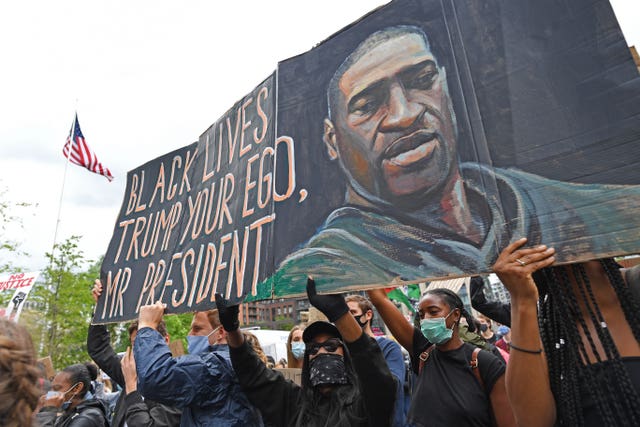
James O'Brien 10am - 1pm
29 March 2021, 16:44

Derek Chauvin pointed Mace towards a bystander who tried to intervene, a court heard.
The former police officer charged with killing George Floyd went on trial in the US city of Minneapolis, with a prosecutor telling the jury that the figure to remember is nine minutes 29 seconds — the amount of time Derek Chauvin’s knee was on Mr Floyd’s neck as the black man pleaded for his life and went limp.
Prosecutor Jerry Blackwell told jurors that Chauvin “didn’t let up, he didn’t get up” even after Mr Floyd said 27 times that he could not breathe and went motionless.
“He put his knees upon his neck and his back, grinding and crushing him, until the very breath, no ladies and gentlemen, until the very life, was squeezed out of him,” Mr Blackwell said.
He said bystander witnesses would include a Minneapolis Fire Department officer who wanted to administer aid.

He said Chauvin pointed Mace at her.
“She wanted to check on his pulse, check on Mr Floyd’s well-being,” Mr Blackwell said.
“She did her best to intervene.
“When she approached Mr Chauvin …. Mr Chauvin reached for his Mace and pointed it in her direction.
“She couldn’t help.”
Widely seen bystander video of the encounter sparked outrage across the US and led to widespread protests and scattered violence.
A jury of 14 people will hear the case, eight who are white and six who are black or multiracial, according to the court.
Two of the 14 will be alternates.
The judge has not said which ones will be alternates and which ones will deliberate the case.
Mr Floyd, 46, was declared dead after Chauvin, who is white, pressed his knee against Mr Floyd’s neck as he lay handcuffed on his belly on the pavement, crying “I can’t breathe.”
Chauvin, 45, is charged with unintentional second-degree murder, third-degree murder and manslaughter.
Almost all of the jurors selected during more than two weeks of questioning said they had seen at least parts of the video, and several acknowledged it gave them at least a somewhat negative view of Chauvin.

But they said they could set that aside.
About dozen people chanted and carried signs in the middle of the street outside the courthouse entrance as Floyd family lawyer Ben Crump, the Reverend Al Sharpton and members of the Floyd family passed by on their way inside.
The group also carried a makeshift coffin, on top of which they placed flowers.
Mr Crump said the trial would be a test of “whether America is going to live up to the Declaration of Independence”.
And he blasted the idea that it would be a tough test for jurors.
“For all those people that continue to say that this is such a difficult trial, that this is a hard trial, we refute that,” he said.
“We know that if George Floyd was a white American citizen, and he suffered this painful, tortuous death with a police officer’s knee on his neck, nobody, nobody, would be saying this is a hard case.”

The trial is expected to last about four weeks at the courthouse in downtown Minneapolis, which has been fortified with concrete barriers, fencing, and barbed and razor wire.
City and state leaders are determined to prevent a repeat of damaging riots that followed Floyd’s death, and National Guard troops have already been mobilised.
The key questions at trial will be whether Chauvin caused Mr Floyd’s death and whether his actions were reasonable.
For the unintentional second-degree murder charge, prosecutors have to prove Chauvin’s conduct was a “substantial causal factor” in Floyd’s death, and that Chauvin was committing felony assault at the time.
For third-degree murder, they must prove that Chauvin’s actions caused Mr Floyd’s death, and were reckless and without regard for human life.
The manslaughter charge requires proof that Chauvin caused Mr Floyd’s death through negligence that created an unreasonable risk.
Unintentional second-degree murder is punishable by up to 40 years in prison in Minnesota, with up to 25 years for third-degree murder, but sentencing guidelines suggest that Chauvin would face 12 1/2 years in prison if convicted on either charge.

Manslaughter has a maximum 10-year sentence.
Chauvin’s lawyer, Eric Nelson, was expected to use his opening statement to tell jurors that medical evidence and use of force experts will show a different view.
Mr Nelson has made clear that the defence will make an issue of Mr Floyd swallowing drugs before his arrest, seeking to convince the jury that he was at least partially responsible for his death.
The county medical examiner’s post mortem noted fentanyl and methamphetamine in Mr Floyd’s system, but listed his cause of death as “cardiopulmonary arrest, complicating law enforcement subdual, restraint, and neck compression”.